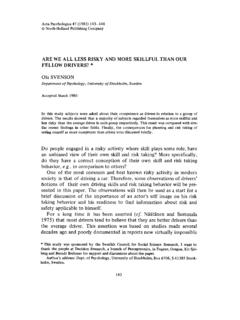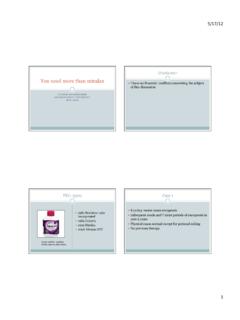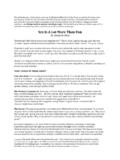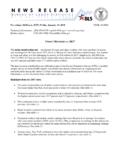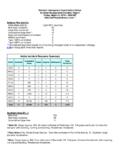Transcription of SERVICE Now More Than Ever - who.int
1 Primary Health CareNowMoreThanEverThe World Health Report 2008 UNIVERSAL COVERAGE REFORMSSERVICE DELIVERY REFORMSLEADERSHIP REFORMSPUBLIC POLICY 17:07 17:07:34 Primary Health CareNowMoreThanEverThe World Health Report 2008 WHO Library Cataloguing-in-Publication DataThe world health report 2008 : primary health care now more than health trends. health care trends. of health care. policy. Health 978 92 4 156373 4 (NLM classifi cation: W )ISSN 1020-3311 World Health Organization 2008 All rights reserved. Publications of the World Health Organization can be obtained from WHO Press, World Health Organization, 20 Avenue Appia, 1211 Geneva 27, Switzerland (tel.: +41 22 791 3264; fax: +41 22 791 4857; e-mail: Requests for permission to reproduce or translate WHO publications whether for sale or for noncommercial distribution should be addressed to WHO Press, at the above address (fax: +41 22 791 4806; e-mail: The designations employed and the presentation of the material in this publication do not imply the expression of any opinion whatsoever on the part of the World Health Organization concerning the legal status of any country, territory, city or area or of its authorities, or concerning the delimitation of its frontiers or boundaries.))
2 Dotted lines on maps represent approximate border lines for which there may not yet be full mention of specifi c companies or of certain manufacturers products does not imply that they are endorsed or recommended by the World Health Organization in preference to others of a similar nature that are not mentioned. Errors and omissions excepted, the names of proprietary products are distinguished by initial capital reasonable precautions have been taken by the World Health Organization to verify the information contained in this publication. However, the published material is being distributed without warranty of any kind, either expressed or implied. The responsibility for the interpretation and use of the material lies with the reader. In no event shall the World Health Organization be liable for damages arising from its use.
3 Information concerning this publication can be obtained from:World Health Report World Health Organization1211 Geneva 27, SwitzerlandE-mail: of this publication can be ordered from: Reda SadkiLayout: Steve Ewart and Reda SadkiFigures: Christophe GrangierPrinting Coordination: Pascale Broisin and Fr d rique Robin-WahlinPrinted in SwitzerlandThe World Health Report 2008 was produced under the overall direction of Tim Evans (Assistant Director-General) and Wim Van Lerberghe (editor-in-chief). The principal writing team consisted of Wim Van Lerberghe, Tim Evans, Kumanan Rasanathan and Abdelhay Mechbal. Other main contributors to the drafting of the report were: Anne Andermann, David Evans, Benedicte Galichet, Alec Irwin, Mary Kay Kindhauser, Remo Meloni, Thierry Mertens, Charles Mock, Hernan Montenegro, Denis Porignon and Dheepa Rajan.
4 Organizational supervision of the report was provided by Ramesh Shademani. Contributions in the form of boxes, fi gures and data analysis came from: Alayne Adams, Jonathan Abrahams, Fiifi Amoako Johnson, Giovanni Ancona, Chris Bailey, Robert Beaglehole, Henk Bekedam, Andre Biscaia, Paul Bossyns, Eric Buch, Andrew Cassels, Somnath Chatterji, Mario Dal Poz, Pim De Graaf, Jan De Maeseneer, Nick Drager, Varatharajan Durairaj, Joan Dzenowagis, Dominique Egger, Ricardo Fabregas, Paulo Ferrinho, Daniel Ferrante, Christopher Fitzpatrick, Gauden Galea, Claudia Garcia Moreno, Andr Griekspoor, Lieve Goeman, Miriam Hirschfeld, Ahmadreza Hosseinpoor, Justine Hsu, Chandika Indikadahena, Mie Inoue, Lori Irwin, Andre Isakov, Michel Jancloes, Miloud Kaddar, Hyppolite Kalambaye, Guy Kegels, Meleckidzedeck Khayesi, Ilona Kickbush, Yohannes Kinfu, Tord Kjellstrom, R diger Krech, Mohamed Laaziri, Colin Mathers.
5 Zoe Matthews, Maureen Mackintosh, Di McIntyre, David Meddings, Pierre Mercenier, Pat Neuwelt, Paolo Piva, Annie Portela, Yongyut Ponsupap, Amit Prasad, Rob Ridley, Ritu Sadana, David Sanders, Salif Samake, Gerard Schmets, Iqbal Shah, Shaoguang Wang, Anand Sivasankara Kurup, Kenji Shibuya, Michel Thieren, Nicole Valentine, Nathalie Van de Maele, Jeanette Vega, Jeremy Veillard and Bob inputs in the form of contributions, peer reviews, suggestions and criticisms were received from the Regional Directors and their staff, from the Deputy Director-General, Anarfi Asamoah Bah, and from the Assistant draft report was peer reviewed at a meeting in Montreux, Switzerland, with the following participants: Azrul Azwar, Tim Evans, Ricardo Fabrega, Sheila Campbell-Forrester, Antonio Duran, Alec Irwin, Mohamed Ali Jaffer, Safurah Jaafar, Pongpisut Jongudomsuk, Joseph Kasonde, Kamran Lankarini, Abdelhay Mechbal, John Martin, Donald Matheson, Jan De Maeseneer, Ravi Narayan, Sydney Saul Ndeki, Adrian Ong, Pongsadhorn Pokpermdee, Thomson Prentice, Kumanan Rasanathan, Salman Rawaf, Bijan Sadrizadeh, Hugo Sanchez, Ramesh Shademani, Barbara Starfi eld, than Tun Sein, Wim Van Lerberghe, Olga Zeus and Maria Hamlin report benefi ted greatly from the inputs of the following participants in a one-week workshop in Bellagio, Italy.
6 Ahmed Abdullatif, Chris Bailey, Douglas Bettcher, John Bryant, Tim Evans, Marie Therese Feuerstein, Abdelhay Mechbal, Thierry Mertens, Hernan Montenegro, Ronald Labonte, Socrates Litsios, Thelma Narayan, Thomson Prentice, Kumanan Rasanathan, Myat Htoo Razak, Ramesh Shademani, Viroj Tangcharoensathien, Wim Van Lerberghe, Jeanette Vega and Jeremy working groups provided the initial inputs into the report. These working groups, of both HQ and Regional staff included: Shelly Abdool, Ahmed Abdullatif, Shambhu Acharya, Chris Bailey, James Bartram, Douglas Bettcher, Eric Blas, Ties Boerma, Robert Bos, Marie-Charlotte Boueseau, Gui Carrin, Venkatraman Chandra-Mouli, Yves Chartier, Alessandro Colombo, Carlos Corvalan, Bernadette Daelmans, Denis Daumerie, Tarun Dua, Joan Dzenowagis, David Evans, Tim Evans, Bob Fryatt, Michelle Funk, Chad Gardner, Giuliano Gargioni, Gulin Gedik, Sandy Gove, Kersten Gutschmidt, Alex Kalache, Alim Khan, Ilona Kickbusch, Yunkap Kwankam, Richard Laing, Ornella Lincetto, Daniel Lopez-Acuna, Viviana Mangiaterra, Colin Mathers, Michael Mbizvo, Abdelhay Mechbal, Kamini Mendis, Shanthi Mendis, Susan Mercado, Charles Mock, Hernan Montenegro, Catherine Mulholland, Peju Olukoya, Annie Portela.
7 Thomson Prentice, Annette Pruss-Ustun, Kumanan Rasanathan, Myat Htoo Razak, Lina Tucker Reinders, Elil Renganathan, Gojka Roglic, Michael Ryan, Shekhar Saxena, Rober t Scherpbier, Ramesh Shademani, Kenji Shibuya, Sameen Siddiqi, Orielle Solar, Francisco Songane, Claudia Stein, Kwok-Cho Tang, Andreas Ullrich, Mukund Uplekar, Wim Van Lerberghe, Jeanette Vega, Jeremy Veillard, Eugenio Villar, Diana Weil and Juliana Yartey. The editorial production team was led by Thomson Prentice, managing editor. The report was edited by Diana Hopkins, assisted by Barbara Campanini. Ga l Kernen assisted on graphics and produced the web site version and other electronic media. Lina Tucker Reinders provided editorial advice. The index was prepared by June Morrison. Administrative support in the preparation of the report was provided by Saba Amdeselassie, Maryse Coutty, Melodie Fadriquela, Evelyne Omukubi and Christine credits: Director-General s photograph: WHO (p.)
8 Viii); introduction and overview: WHO/Marco Kokic (p. x); chapters 1 6: Alayne Adams (p. 1); WHO/Christopher Black (p. 23); WHO/Karen Robinson (p. 41); International Federation of Red Cross and Red Crescent Societies/John Haskew (p. 63); Alayne Adams (p. 81); WHO/Thomas Moran (p. 99).iiiContentsiiiThe World Health Report 2008 Primary Health Care Now more than EverMessage from the Director-GeneralviiiIntroduction and OverviewxiResponding to the challenges of a changing worldxiiGrowing expectations for better performancexiiiFrom the packages of the past to the reforms of the futurexivFour sets of PHC reformsxviSeizing opportunitiesxviiiChapter 1. The challenges of a changing world1 Unequal growth, unequal outcomes2 Longer lives and better health, but not everywhere2 Growth and stagnation4 Adapting to new health challenges7A globalized, urbanized and ageing world7 Little anticipation and slow reactions9 Trends that undermine the health systems response11 Hospital-centrism: health systems built around hospitals and specialists11 Fragmentation: health systems built around priority programmes12 Health systems left to drift towards unregulated commercialization13 Changing values and rising expectations14 Health equity 15 Care that puts people fi rst16 Securing the health of communities16 Reliable, responsive health authorities17 Participation18 PHC reforms: driven by demand18 Chapter 2.
9 Advancing and sustaining universal coverage23 The central place of health equity in PHC24 Moving towards universal coverage25 Challenges in moving towards universal coverage27 Rolling out primary-care networks to fi ll the availability gap28 Overcoming the isolation of dispersed populations30 Providing alternatives to unregulated commercial services31 Targeted interventions to complement universal coverage mechanisms32 Mobilizing for health equity34 Increasing the visibility of health inequities34 Creating space for civil society participation and empowerment35 Primary Health Care Now more than EverivThe World Health Report 2008 Chapter 3. Primary care: putting people fi rst41 Good care is about people42 The distinctive features of primary care43 Effectiveness and safety are not just technical matters43 Understanding people: person-centred care46 Comprehensive and integrated responses48 Continuity of care49A regular and trusted provider as entry point50 Organizing primary-care networks52 Bringing care closer to the people53 Responsibility for a well-identifi ed population53 The primary-care team as a hub of coordination55 Monitoring progress56 Chapter 4.
10 Public policies for the public s health63 The importance of effective public policies for health64 System policies that are aligned with PHC goals66 Public-health policies67 Aligning priority health programmes with PHC67 Countrywide public-health initiatives68 Rapid response capacity68 Towards health in all policies69 Understanding the under-investment71 Opportunities for better public policies73 Better information and evidence73A changing institutional landscape74 Equitable and effi cient global health action76 Chapter 5. Leadership and effective government81 Governments as brokers for PHC reform82 Mediating the social contract for health82 Disengagement and its consequences83 Participation and negotiation85 Effective policy dialogue86 Information systems to strengthen policy dialogue86 Strengthening policy dialogue with innovations from the fi eld89 Building a critical mass of capacity for change90 Managing the political process: from launching reform to implementing it92 Chapter 6.










